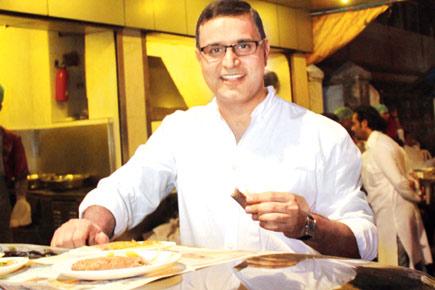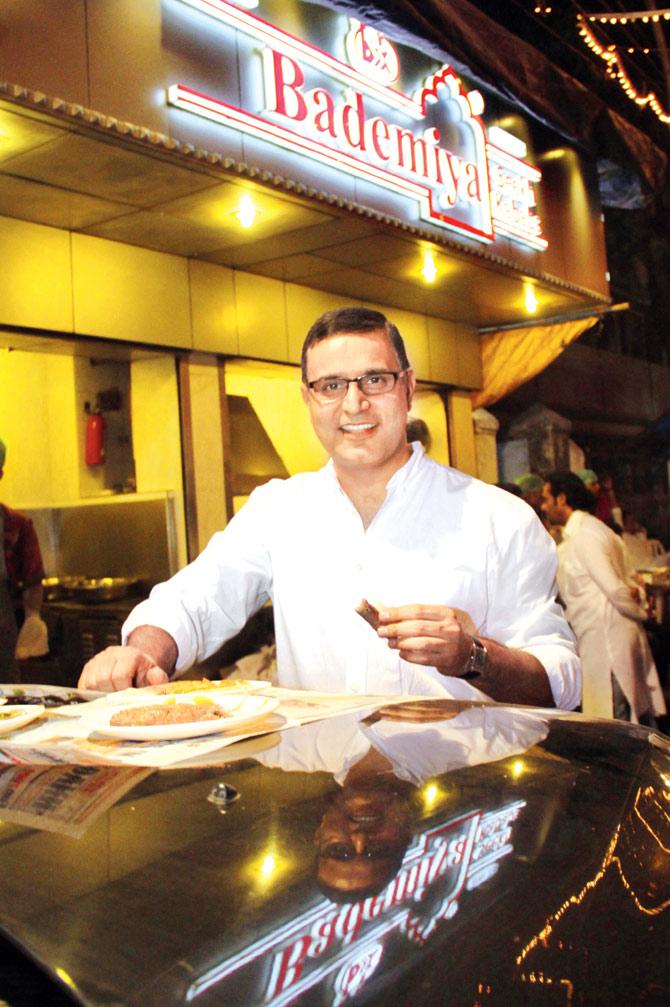Michelin-starred chef, Atul Kochhar brings back flavours of India from around the world to his soon to launch BKC restaurant, NRI

Star chef Atul Kochhar at Bademiya, Colaba
![]() When we asked Atul Kochhar about his favourite Mumbai haunt, he picked Bademiya; not the newer fine-dining version, but the gritty, off-road stall in Colaba, "because it has maintained its authenticity in flavour and looks almost as it did decades ago."
When we asked Atul Kochhar about his favourite Mumbai haunt, he picked Bademiya; not the newer fine-dining version, but the gritty, off-road stall in Colaba, "because it has maintained its authenticity in flavour and looks almost as it did decades ago."
ADVERTISEMENT
That's an unexpected choice for one of Britain's acclaimed chefs, one to have been invited to cook for Prince Charles at St James Palace, London. Yet, Kochhar seemed perfectly at home munching on sheekh kebabs and baida roti, off plastic plates, washing the snack down with Thums Up. All this with the support of the boot of his car.
Star chef Atul Kochhar at Bademiya, Colaba. Pic/Sharad Vegda
Twenty-two years in England, but Kochhar displays his desi-ness, while saying, "I would never have left India if I had the economic choice." And now he's ready to take Mumbai by storm with the quirky restaurant, NRI (Not Really Indian), set to open in BKC, mid November.
India for the world
Since authentic Indian was available, he thought of bringing home Indian recipes that had travelled the globe, and subsequently changed over centuries; food with a history attached to it.
Kochhar elaborates, "Our food has been going out of India for centuries, thanks to the British. When Indian immigrants first went abroad, (starting with the days when labourers were sent, by the boat-load, to work in Mauritius, South Africa, Trinidad and Tobago), they took with them their idols, clothes and spices.
When the spices ran out, they experimented and substituted with locally grown products. And new recipes were born." That's what NRI will serve. "Every dish tells a tale," he says.
Bunny-Chow is a favourite on the menu, a popular fast-food dish in South Africa. Kochhar reveals, Indians, largely from the Bania community, dominated Durban, along with the Chinese. Ethnic communities in South Africa weren't allowed at certain cafes and stores during Apartheid.
As a result, a Bania-run store in Durban served minorities using the back door. This brave vendor opted for a convenient and quick method to cater to them; he scooped out bread loafs and filled them with meat or vegetarian curries. The end product could be whisked away without attracting the attention of authorities. And the Bunny-Chow was born.
Them and us
With a passion for food that goes beyond the palate, Kochhar says, "The British introduced us to biscuits and cakes. We gave them their much-loved curries, and khichdi. Politics aside, the human race has become more tolerant thanks to food, since this is where we have something to give." He sums up, "Food is the language of the world."
Aptly, the decor of NRI captures days gone-by: Victorian benches, once seen at railway stations during the British era; antique lamp-posts and sepia hues.
Local is the way
While NRI's recipes came from the immigrants, Kochhar insists on home-grown produce. "A friend owns a plot in Ganeshpuri, outside Mumbai. He has been generous enough to give me four acres. It won't be possible to grow everything on this plot, the rest will be sourced from across India," he shares. To get the best of the country, Kochhar has connected with well-known horticulturist Dr Iyengar.
"I have visited organic farms in Nashik and Lonavala, sourced an artisan cheese factory in Coorg and visited a farm that's into ethical goat herding," he informs. On the latter, he says, "India is known for ethics. I have found that local farmers and chefs insist on humane treatment of animals."
Realising that change begins at the grass-roots, Kochhar, who has studied similar models of locally grown foods, and ethical farming in Peru, Mexico, and Brazil, knows it's a possibility in India.
While NRI has an elaborate philosophy, his other haunt, set to open in December, is Lima Bar and Restaurant. "It's a bar before it's a restaurant and is inspired by night-outs in Latin America," he adds. In conclusion, he reveals a theme that binds his seemingly different ventures: "As Indians, we're always ready to accept new cultures and ways of life."
 Subscribe today by clicking the link and stay updated with the latest news!" Click here!
Subscribe today by clicking the link and stay updated with the latest news!" Click here!






